最新[太空探索是否值得英语作文]我们需要太空探索吗英语作文范文.doc
英语作文论证太空探索值不值得
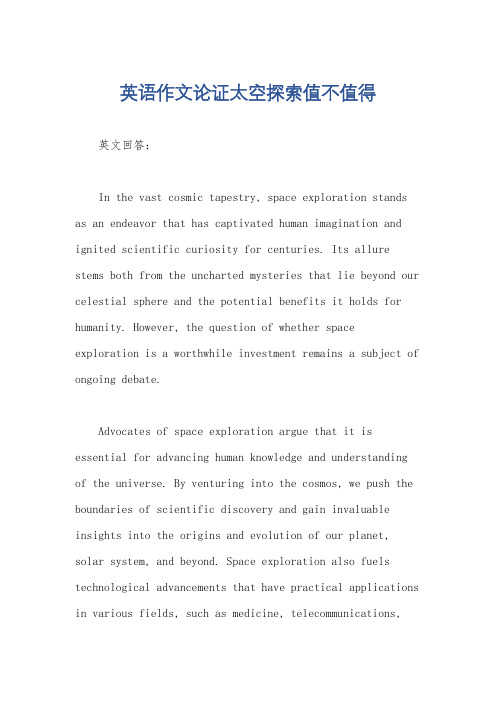
英语作文论证太空探索值不值得英文回答:In the vast cosmic tapestry, space exploration stands as an endeavor that has captivated human imagination and ignited scientific curiosity for centuries. Its allure stems both from the uncharted mysteries that lie beyond our celestial sphere and the potential benefits it holds for humanity. However, the question of whether space exploration is a worthwhile investment remains a subject of ongoing debate.Advocates of space exploration argue that it is essential for advancing human knowledge and understanding of the universe. By venturing into the cosmos, we push the boundaries of scientific discovery and gain invaluable insights into the origins and evolution of our planet, solar system, and beyond. Space exploration also fuels technological advancements that have practical applications in various fields, such as medicine, telecommunications,and materials science.Furthermore, space exploration fosters international cooperation and promotes a sense of shared human endeavor. By collaborating on ambitious projects, nations can overcome political and cultural divides and work towards a common goal. Additionally, space exploration can inspire future generations of scientists and engineers, cultivating a passion for knowledge and exploration.Opponents of space exploration, on the other hand, contend that it is an extravagant expense that diverts resources from more pressing terrestrial concerns. They argue that the vast sums invested in space exploration could be better allocated to alleviate poverty, combat climate change, or address other urgent social and environmental problems. Moreover, they question the practical benefits of space exploration, suggesting that the knowledge and technologies it produces could be achieved through less costly means.In assessing the merits of space exploration, it isimportant to consider both its potential benefits and limitations. While it is undeniable that space exploration has the capacity to advance human knowledge and technological progress, it is also essential to weigh these gains against the costs and opportunity costs involved. The decision of whether or not space exploration is worth pursuing is ultimately a complex one that requires a nuanced understanding of its potential impacts.In conclusion, the question of whether space exploration is a worthwhile investment has no easy answer. There are compelling arguments to be made both for and against it. However, by carefully weighing the potential benefits and drawbacks, we can make informed decisions about the allocation of resources and the direction of our collective human endeavors.中文回答:太空探索是否值得投资是一个备受争议的话题。
是否应该进行太空探索英语作文雅思
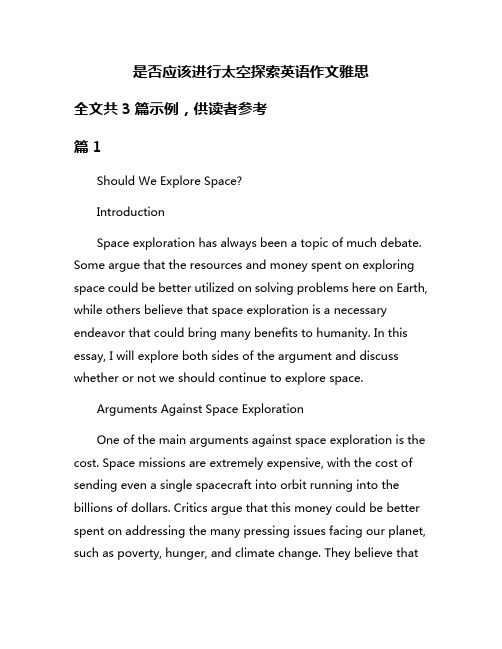
是否应该进行太空探索英语作文雅思全文共3篇示例,供读者参考篇1Should We Explore Space?IntroductionSpace exploration has always been a topic of much debate. Some argue that the resources and money spent on exploring space could be better utilized on solving problems here on Earth, while others believe that space exploration is a necessary endeavor that could bring many benefits to humanity. In this essay, I will explore both sides of the argument and discuss whether or not we should continue to explore space.Arguments Against Space ExplorationOne of the main arguments against space exploration is the cost. Space missions are extremely expensive, with the cost of sending even a single spacecraft into orbit running into the billions of dollars. Critics argue that this money could be better spent on addressing the many pressing issues facing our planet, such as poverty, hunger, and climate change. They believe thatthe resources used for space exploration could be more effectively utilized to improve the lives of people here on Earth.Another argument against space exploration is the lack of immediate benefits. Critics argue that the technology developed for space missions, such as satellites and rockets, has very limited applications outside of space exploration. They believe that the benefits of space exploration do not justify the enormous cost and effort involved.Arguments For Space ExplorationDespite the arguments against space exploration, there are many who believe that it is a worthwhile endeavor. One of the main arguments in favor of space exploration is the potential for scientific discovery. Space has always been a source of fascination for humans, and exploring it can lead to new insights and discoveries that could benefit humanity as a whole. For example, space missions have led to the development of new technologies and materials that have had applications beyond space exploration.Another argument in favor of space exploration is its potential to inspire and unite people. The idea of exploring the unknown and reaching for the stars has always captured the imagination of people around the world. Space missions havethe power to inspire young people to pursue careers in science and technology, and can bring nations together in pursuit of a common goal.ConclusionIn conclusion, the question of whether or not we should explore space is a complex one with no easy answers. While there are valid arguments against space exploration, such as the high cost and lack of immediate benefits, there are also compelling arguments in favor of it, such as the potential for scientific discovery and the ability to inspire people. Ultimately, whether or not we should explore space will depend on how we balance the costs and benefits of such endeavors. In my opinion, space exploration is a valuable and important endeavor that has the potential to bring many benefits to humanity.篇2Should We Pursue Space Exploration?Space exploration has long been a topic of fascination for humanity. From the first Moon landing in 1969 to the recent Mars rover missions, the idea of exploring the vast expanse of outer space has captured the imaginations of people around theworld. However, the question remains: should we continue to invest time, resources, and energy into space exploration?There are compelling arguments on both sides of the debate. Proponents of space exploration argue that it is essential for scientific advancement and discovery. By exploring other planets, moons, and celestial bodies, we can gain a better understanding of the universe and our place within it. Additionally, studying other planets and moons can provide valuable insights into Earth's own history and future. For example, studying Mars could help us better understand the possibility of colonization or the search for extraterrestrial life.Furthermore, space exploration can inspire future generations of scientists, engineers, and astronauts. The Moon landing of 1969 sparked a wave of interest in STEM fields, leading to advancements in technology and knowledge that have shaped the modern world. By continuing to push the boundaries of space exploration, we can inspire the next generation to pursue careers in science and technology.On the other hand, critics of space exploration argue that the resources spent on space missions could be better allocated to solving problems here on Earth. With issues such as climate change, poverty, and inequality facing our planet, some arguethat investing in space exploration is a luxury we cannot afford. Additionally, the costs of space missions are often exorbitant, with little immediate return on investment.However, proponents of space exploration counter these arguments by pointing out the many practical benefits that space exploration has brought to our daily lives. From the development of satellite technology to the creation of new materials and medical advancements, the innovations that have come from space exploration have had far-reaching impacts on society. Additionally, the pursuit of space exploration has pushed the boundaries of human knowledge, leading to discoveries that have fundamentally changed our understanding of the universe.In conclusion, the question of whether we should continue to pursue space exploration is a complex and multifaceted one. While there are valid arguments on both sides of the debate, it is clear that space exploration has brought numerous benefits to society and has the potential to continue to do so in the future. By investing in space exploration, we can continue to push the boundaries of human knowledge, inspire future generations, and pave the way for a brighter future for all of humanity. Ultimately, the pursuit of space exploration is a worthwhile endeavor thatholds the promise of unlocking the mysteries of the universe and shaping the course of human history for generations to come.篇3Should We Explore Space?With the advancement of technology, the idea of space exploration has captured the imagination of many people around the world. Some argue that we should continue to explore and expand into space, while others believe that we should focus on issues here on Earth. In this essay, I will discuss both sides of the debate and provide my own opinion on whether or not we should explore space.Those in favor of space exploration argue that it is essential for the progress and development of humanity. They believe that exploring space can lead to new discoveries, advancements in technology, and a better understanding of the universe. Additionally, they argue that space exploration can inspire future generations and foster innovation in science and technology. For example, the Apollo missions to the moon in the 1960s and 1970s are often cited as a testament to the power of human ingenuity and determination.Furthermore, proponents of space exploration argue that investing in space exploration can have economic benefits. For instance, space missions can create jobs and stimulate economic growth in the aerospace industry. Additionally, the technologies developed for space exploration, such as satellite communication and GPS, have practical applications that benefit society as a whole.On the other hand, critics of space exploration argue that it is a waste of resources and money that could be better spent on addressing issues here on Earth. They point to the high cost of space missions, such as the International Space Station, which has cost billions of dollars to build and maintain. They argue that this money could be better spent on solving global issues such as poverty, hunger, and climate change.Critics also argue that space exploration is often driven by political and nationalistic motivations rather than scientific curiosity. For example, the Space Race between the United States and the Soviet Union during the Cold War was fueled by political rivalry rather than a genuine desire to explore and discover.In my opinion, I believe that space exploration is an important endeavor that should be pursued. While it is true that there are many pressing issues here on Earth that requireattention and resources, I believe that exploring space can also have significant benefits for humanity. As we continue to explore and understand the universe, we can gain insights into our own planet and the challenges we face. Additionally, space exploration can inspire future generations to pursue careers in science and technology, leading to innovation and progress in these fields.In conclusion, the debate over whether or not we should explore space is complex and multifaceted. While there are valid arguments on both sides, I believe that the benefits of space exploration outweigh the costs. By continuing to explore and expand into space, we can unlock new discoveries, technologies, and opportunities that can benefit humanity as a whole.。
太空探索有价值吗英语作文
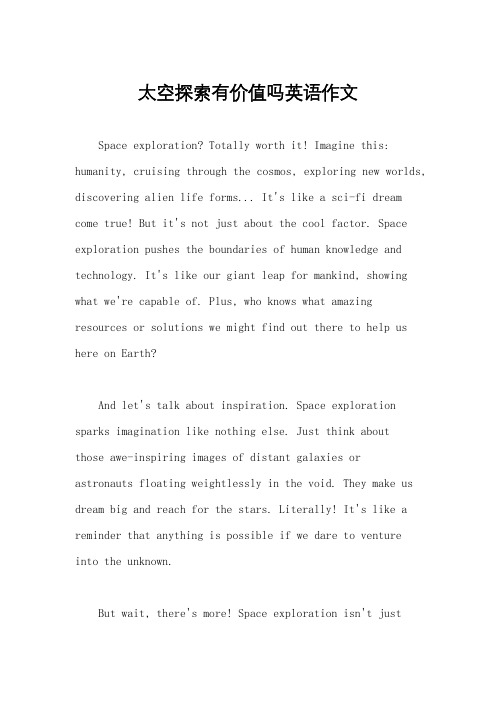
太空探索有价值吗英语作文Space exploration? Totally worth it! Imagine this: humanity, cruising through the cosmos, exploring new worlds, discovering alien life forms... It's like a sci-fi dream come true! But it's not just about the cool factor. Space exploration pushes the boundaries of human knowledge and technology. It's like our giant leap for mankind, showing what we're capable of. Plus, who knows what amazing resources or solutions we might find out there to help us here on Earth?And let's talk about inspiration. Space exploration sparks imagination like nothing else. Just think aboutthose awe-inspiring images of distant galaxies orastronauts floating weightlessly in the void. They make us dream big and reach for the stars. Literally! It's like a reminder that anything is possible if we dare to ventureinto the unknown.But wait, there's more! Space exploration isn't justabout flashy missions to Mars or Jupiter's moons. It's also about understanding our own planet better. Satellites orbiting Earth help us monitor climate change, trackweather patterns, and even predict natural disasters. So, yeah, exploring space isn't just about looking outwards;it's also about looking homewards and taking care of this pale blue dot we call home.And let's not forget the practical stuff. Space tech gives us things we use every day, from scratch-resistant lenses to memory foam mattresses. And hey, ever heard of GPS? Yep, that's space magic right there, making sure we never get lost on road trips or hikes.So, is space exploration valuable? You betcha! It's not just about exploring strange new worlds; it's about pushing boundaries, inspiring generations, understanding our own planet, and yeah, even making our lives a little bit easier. So, let's keep reaching for the stars!。
太空探险是否值得英语作文
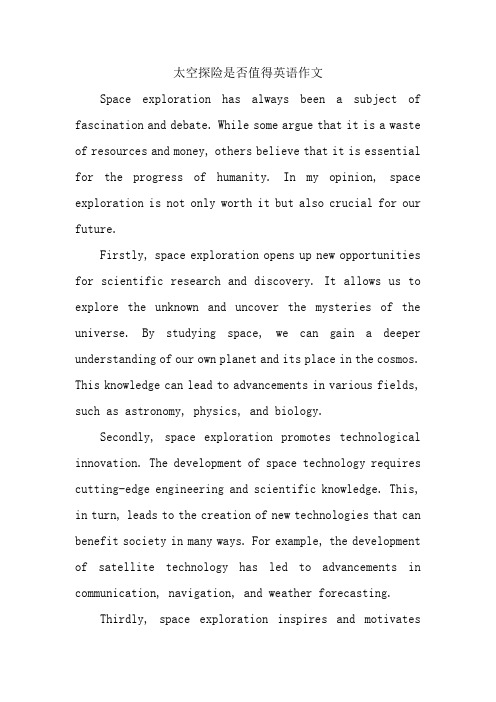
太空探险是否值得英语作文Space exploration has always been a subject of fascination and debate. While some argue that it is a waste of resources and money, others believe that it is essential for the progress of humanity. In my opinion, space exploration is not only worth it but also crucial for our future.Firstly, space exploration opens up new opportunities for scientific research and discovery. It allows us to explore the unknown and uncover the mysteries of the universe. By studying space, we can gain a deeper understanding of our own planet and its place in the cosmos. This knowledge can lead to advancements in various fields, such as astronomy, physics, and biology.Secondly, space exploration promotes technological innovation. The development of space technology requires cutting-edge engineering and scientific knowledge. This, in turn, leads to the creation of new technologies that can benefit society in many ways. For example, the development of satellite technology has led to advancements in communication, navigation, and weather forecasting.Thirdly, space exploration inspires and motivatesfuture generations. It ignites a sense of curiosity and wonder in children and young adults, encouraging them to pursue careers in science, technology, engineering, and mathematics (STEM). By inspiring the next generation of scientists and engineers, space exploration can contribute to the continued progress of humanity.Fourthly, space exploration fosters international cooperation and collaboration. The exploration of space requires the collective efforts of countries around the world. This collaboration can lead to improved relations and understanding between nations, promoting peace and stability.In conclusion, space exploration is not only worth it but also crucial for our future. It opens up new opportunities for scientific research, promotes technological innovation, inspires future generations, and fosters international cooperation. By investing in space exploration, we can contribute to the continued progress of humanity and pave the way for a better future.中文翻译:太空探险一直是令人着迷和争议的话题。
太空探索是否重要英语作文

太空探索是否重要英语作文Title: The Significance of Space Exploration。
Space exploration stands as one of the most significant endeavors of humanity. Its importance transcends borders and cultures, shaping our understanding of the universe and advancing technological frontiers. Here, we delve into the multifaceted significance of space exploration.Firstly, space exploration fuels scientific discovery. Through ventures like manned missions, satellite launches, and interplanetary probes, we expand our knowledge of celestial bodies and cosmic phenomena. For instance, the study of Mars provides insights into planetary evolution and the possibility of extraterrestrial life. Moreover, missions like the Hubble Space Telescope offer unprecedented views of distant galaxies, unveiling the mysteries of the cosmos.Secondly, space exploration drives technologicalinnovation. The challenges of space travel necessitate cutting-edge solutions in engineering, materials science, and robotics. Technologies developed for space missionsoften find applications in everyday life, such as GPS navigation, satellite communications, and medical imaging. Furthermore, innovations like reusable rockets promise to revolutionize space access, making exploration more sustainable and cost-effective.Moreover, space exploration inspires human ambition and curiosity. The sight of astronauts venturing beyond Earth captivates imaginations worldwide, fostering a sense of wonder and exploration. Icons like Neil Armstrong and Yuri Gagarin symbolize the indomitable spirit of explorationthat propels humanity forward. Additionally, space missions serve as a testament to international cooperation, with nations pooling resources and expertise for sharedscientific goals.Furthermore, space exploration holds economic potential. The burgeoning space industry presents opportunities for investment and entrepreneurship, with ventures ranging fromasteroid mining to space tourism. As commercial space endeavors expand, they stimulate economic growth, create jobs, and spur technological spin-offs that benefit society as a whole. Moreover, space resources like helium-3 and rare metals could alleviate resource scarcity on Earth, offering long-term economic benefits.Additionally, space exploration contributes to global security and environmental monitoring. Satellites play a crucial role in monitoring climate change, natural disasters, and environmental degradation. They providevital data for disaster response, resource management, and environmental conservation efforts. Furthermore, space-based surveillance enhances national security by monitoring potential threats, ensuring early warning capabilities, and facilitating communication networks.In conclusion, space exploration is of paramount importance to humanity. It drives scientific discovery, fuels technological innovation, inspires human ambition, and holds economic potential. Moreover, it contributes to global security and environmental monitoring, benefitingboth present and future generations. As we continue to explore the cosmos, we expand the horizons of knowledge and possibility, reaffirming our place in the universe.。
太空是否值得探索的英语作文

太空是否值得探索的英语作文太空是否值得探索的英语作文(精选5篇)在学习、工作、生活中,大家总少不了接触作文吧,作文是从内部言语向外部言语的过渡,即从经过压缩的简要的、自己能明白的语言,向开展的、具有规范语法结构的、能为他人所理解的外部语言形式的转化。
那么一般作文是怎么写的呢?以下是小编精心整理的太空是否值得探索的英语作文,欢迎阅读,希望大家能够喜欢。
太空是否值得探索的英语作文篇1almost everyday we may see something in the newspaper or on tv about the latest exciting developments in space exploration. there is an immense pride in our science and technology and a sense of its importance for the welfare of mankind.not everyone , however, shares this feeling. ever since space research began, it has been criticized as a huge waste of money and other resources, which might be used to help to relieve the suffering of the earth’s starving millions. it has also been felt that the space program might lead to the total destruction of the earth. despite these disadvantages and potential dangers, the advantages are far greater. we have already succeeded in using satellites for communications, weather forecast and oil exploration and with further space research, more problems we are having now can be solved. for instance, with the success of space shuttles and the feasibility of living in other planets, we may solve the population problem on the earth. space projects will also enable us to find a few chemical elements to cure presently incurable diseases.space exploration contributes not only to the improvement of the quality of human life, but also to our understanding of the interdependence of all beings; and therefore, of the need to takebetter care of each other.太空是否值得探索的英语作文篇2Space Exploration太空探索In recent years, scientists in many parts of the worldhave pooled their money, time and efforts toresearch the space.They launch the satellites, establish the spacestations, and even walk on the moon.Space may hold wonders and mysteries of how theuniverse comes into being, or whether there is lifeon other planets besides Earth.Space exploration is of great significance.First of all, through space exploration, we humanbeing may uncover the unknown resources of the universe.It endows us with knowledge about the origin of life, with which we learn the dangers and makeadventures in science and technology.Secondly, space exploration also provides a platform for nations to cooperate throughparticipation in joint breakthrough.Finally, the space technology plays an indispensable role in our daily life, such ascommunication and transportation technology.In the near future, more nations will get involved in the cause of space exploration.Some questions having intrigued human throughout the centuries are in the list of solution.太空是否值得探索的英语作文篇3man has been fascinated by outer space for thousands of years. it has been almost over forty years since man's first landing on the moon. now, some people believe that space exploration is a sheer waste of time and money. they point out the fact thatit cost billions of dollars to carry on the space research, but a little information was brought back.however, every coin has two sides. there are still a majority of other people who believe that space exploration has more advantages. and i agree with those people. many new products,such as weather and communication satellites,are also products of space programs, and they have benefited people all over the world. and what's more, scientific knowledge about outer space has been acquired by mankind.we believed that it wi!/bring more benefits in the future,which we can not even imagine now. space exploration is a challenge to human beings. that's why several nations try hard to carry out space exploration continuously.太空是否值得探索的`英语作文篇4Man has been fascinated by outer space for thousands of years, It has been almost over forty years since man’ s first landing on the moon. Now, some people believe that space exploration is a sheer waste of time and money. They point out the thct that it cost billions of dollars to can3’ on the space research, but a little infrmation was brought back. In addition, the time and money spent on space exploration is too much to calculate.However, every coin has two sides. There are still a majority of other people who believe that space exploration has more advantages. And I agree with those people. Many new products, such as weather and communication satellites, are also products of space programs, and they have benefitted people all over the world. And what’ s more. scientific knowledge about outer space has been acquired by the mankind.We benefited a lot from space exploration. We believed thatit will bring more benefits in the future, which perhaps we can not even imagine now’. Space exploration is a challenge to human beings. That’ s why several nations try hard to carry out space exploration continuously.几千年来,人类一直着迷于太空,这距人类第一次登上月球已超过四十年了。
人类该不该进行太空探索英语作文

人类该不该进行太空探索英语作文Humanity has always been driven by a deep-seated curiosity to explore the unknown and push the boundaries of our understanding of the universe. The quest for space exploration has been a part of this innate human desire to discover and unravel the mysteries that lie beyond our planet. As we stand at the cusp of a new era of space exploration, the debate on whether humans should continue to pursue this endeavor has become increasingly contentious. While some argue that the resources and efforts invested in space exploration could be better utilized to address pressing issues on Earth, others believe that the potential benefits of space exploration far outweigh the costs.One of the primary arguments in favor of continued space exploration is the potential for scientific and technological advancements. The research and development required for space missions have often led to groundbreaking discoveries and innovations that have had a profound impact on our daily lives. For instance, the development of satellite technology has revolutionized our communication systems, weather forecasting, and navigationcapabilities. Additionally, the study of microgravity and the unique conditions of space have led to advancements in fields such as medicine, materials science, and energy production.Moreover, space exploration has the potential to uncover new resources and habitable environments that could be crucial for the long-term survival and expansion of the human species. As the Earth's resources become increasingly strained, the exploration of other celestial bodies, such as asteroids or the Moon, could provide access to valuable minerals, water, and even potential sites for future human settlements. This could not only alleviate the strain on Earth's resources but also pave the way for the establishment of extraterrestrial colonies, ensuring the continued survival and progress of humanity.Another compelling argument in favor of space exploration is the potential for scientific discoveries that could fundamentally change our understanding of the universe and our place within it. The exploration of distant planets, stars, and galaxies can provide insights into the origins and evolution of the cosmos, as well as the potential for the existence of extraterrestrial life. These discoveries could have profound implications for our philosophical and religious beliefs, as well as our scientific understanding of the universe.Furthermore, space exploration can serve as a catalyst forinternational cooperation and collaboration. The development of space programs often requires the pooling of resources, expertise, and technological capabilities from various nations, fostering a sense of global unity and shared purpose. This collaboration can help to bridge cultural and political divides, promoting peaceful coexistence and the exchange of ideas and knowledge.However, critics of space exploration argue that the resources and funding directed towards these endeavors could be better utilized to address pressing issues on Earth, such as poverty, disease, and environmental degradation. They contend that the vast sums of money invested in space exploration could be more effectively allocated to improving the quality of life for people around the world.Additionally, some argue that the environmental impact of space exploration, particularly the launch of rockets and the disposal of space debris, can be detrimental to the Earth's ecosystems. They assert that the resources and energy consumed by space programs could be better directed towards the development of sustainable and eco-friendly technologies that could benefit the planet.While these concerns are valid, proponents of space exploration argue that the long-term benefits of continued exploration can outweigh the short-term costs. They believe that the knowledge and technological advancements gained through space exploration canultimately lead to solutions for many of the challenges facing humanity on Earth.Moreover, the exploration of space can serve as a source of inspiration and motivation for future generations, sparking their curiosity and fostering a sense of wonder and awe. This can inspire young people to pursue careers in science, technology, engineering, and mathematics, ultimately contributing to the advancement of human knowledge and the betterment of society.In conclusion, the debate on whether humans should continue to pursue space exploration is a complex and multifaceted issue. While there are valid arguments on both sides, the potential benefits of space exploration, including scientific and technological advancements, the discovery of new resources and habitable environments, and the promotion of international cooperation, suggest that the pursuit of space exploration is a worthwhile endeavor. As we navigate the challenges and uncertainties of the future, the continued exploration of the cosmos can provide us with the knowledge, resources, and inspiration needed to ensure the long-term survival and progress of humanity.。
我们要不要做太空探索 英语作文
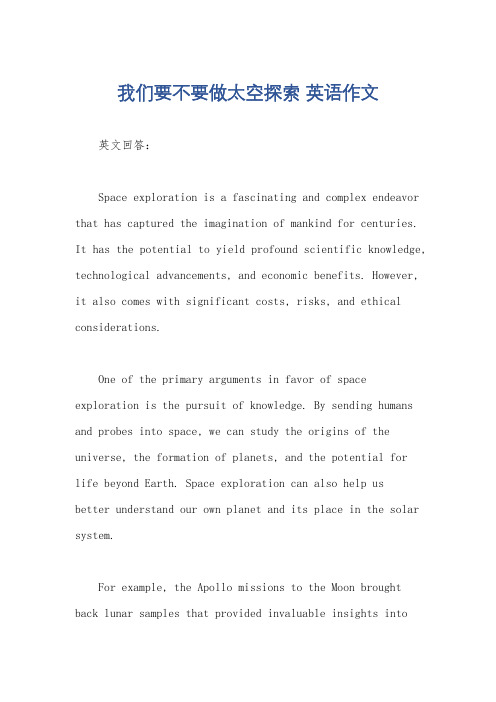
我们要不要做太空探索英语作文英文回答:Space exploration is a fascinating and complex endeavor that has captured the imagination of mankind for centuries. It has the potential to yield profound scientific knowledge, technological advancements, and economic benefits. However, it also comes with significant costs, risks, and ethical considerations.One of the primary arguments in favor of space exploration is the pursuit of knowledge. By sending humans and probes into space, we can study the origins of the universe, the formation of planets, and the potential forlife beyond Earth. Space exploration can also help usbetter understand our own planet and its place in the solar system.For example, the Apollo missions to the Moon brought back lunar samples that provided invaluable insights intothe Moon's composition and geological history. The Mars rovers have discovered evidence of past liquid water on the planet, raising the possibility that Mars was once habitable. The Hubble Space Telescope has allowed us to observe distant galaxies and star-forming regions, giving us a glimpse into the early universe.Another argument for space exploration is the potential for technological advancements. The development of rockets, satellites, and other space technologies has led to spin-off benefits in various fields, such as medicine, transportation, and communication.For instance, the development of artificial limbs for astronauts has inspired advances in prosthetics for amputees. Satellite technology has improved weather forecasting, navigation, and telecommunications. Space exploration has also stimulated research in materials science, computer technology, and renewable energy.Furthermore, space exploration can also have economic benefits. The global space industry is estimated to beworth hundreds of billions of dollars, creating jobs and fostering economic growth in various sectors.For example, the commercialization of satellite technology has led to the development of new industries, such as satellite broadband and remote sensing. Space tourism is also a growing market, with companies offering flights to the International Space Station and suborbital spaceflights.However, it is important to acknowledge that space exploration also comes with significant costs. Governments and private companies invest billions of dollars in space missions, which could be allocated to other areas, such as education, healthcare, or poverty reduction.Additionally, there are inherent risks involved in space exploration. Space travel is dangerous, and accidents can have fatal consequences. Astronauts must undergo rigorous training and endure extreme conditions, such as weightlessness, radiation, and isolation.Moreover, there are ethical considerations to be taken into account. Should we prioritize space exploration over addressing pressing issues on Earth? Is it justified to spend vast sums of money on space travel while people live in poverty?Ultimately, the decision of whether or not to pursue space exploration is a complex one. There are compelling arguments both for and against it. It requires a careful weighing of the potential benefits and risks, as well as a consideration of the ethical implications.中文回答:我们是否应该进行太空探索?太空探索是一项令人着迷且复杂的努力,几个世纪以来一直吸引着人类的想象力。
- 1、下载文档前请自行甄别文档内容的完整性,平台不提供额外的编辑、内容补充、找答案等附加服务。
- 2、"仅部分预览"的文档,不可在线预览部分如存在完整性等问题,可反馈申请退款(可完整预览的文档不适用该条件!)。
- 3、如文档侵犯您的权益,请联系客服反馈,我们会尽快为您处理(人工客服工作时间:9:00-18:30)。
【个人简历范文】
Man has been fascinated by outer space for thousands of years, It has been almost over forty years since man’ s first landing on the moon. Now, some people believe that space exploration is a sheer waste of time and money. They point out the thct that it cost billions of dollars to can3’ on the space research, but a little infrmation was brought back. In addition, the time and money spent on space exploration is too much to calculate.
However, every coin has two sides. There are still a majority of other people who believe that space exploration has more advantages. And I agree with those people. Many new products, such as weather and communication satellites, are also products of space programs, and they have benefitted people all over the world. And what’s more. scientific knowledge about outer space has been acquired by the mankind.
We benefited a lot from space exploration. We believed that it will bring more benefits in the future, which perhaps we can not even imagine now’. Space exploration is a challenge to human beings. That’ s why several nations try hard to carry out space exploration continuously.
几千年来,人类一直着迷于太空,这距人类第一次登上月球已超过四十年了。
现在,有些人认为空间探索完全是浪费时间和金钱。
他们指出的它花费数十亿美元用于太空研究,但收获甚微。
此外,时间和金钱花费在太空探索计算太多了。
然而,事物都是一分为二的。
仍有大多数人认为太空探索有更多优势。
我同意这些人的观点。
许多新产品,如气象、通信卫星,也是空间的产品项目,世界各地的人们受益。
和更重要的。
人类获得了关于外太空的科学知识。
我们从太空探索中受益很多。
我们相信它会带来更多的利益在未来,或许我们现在无法想象的。
太空探索是对人类的挑战。
这就是为什么一些国家不断努力进行太空探索。
